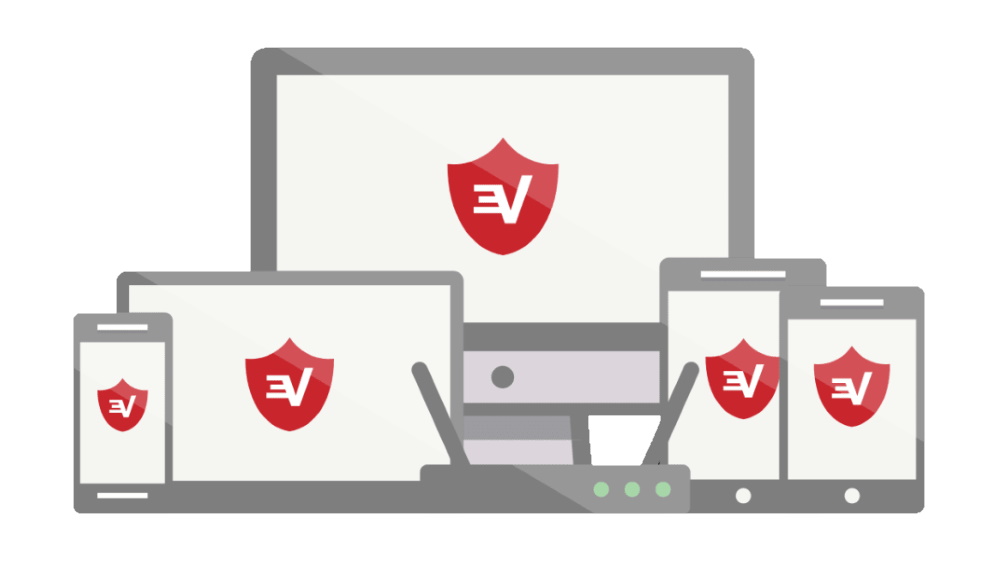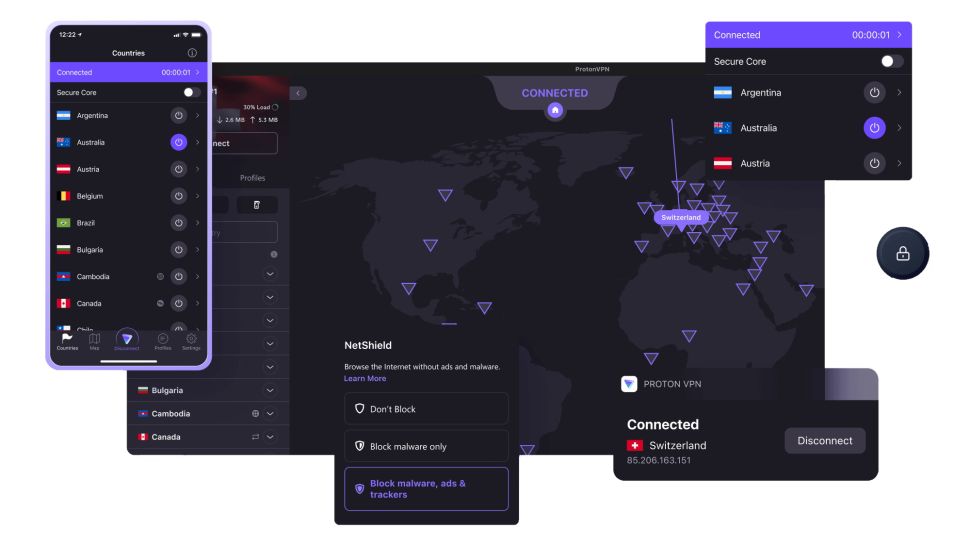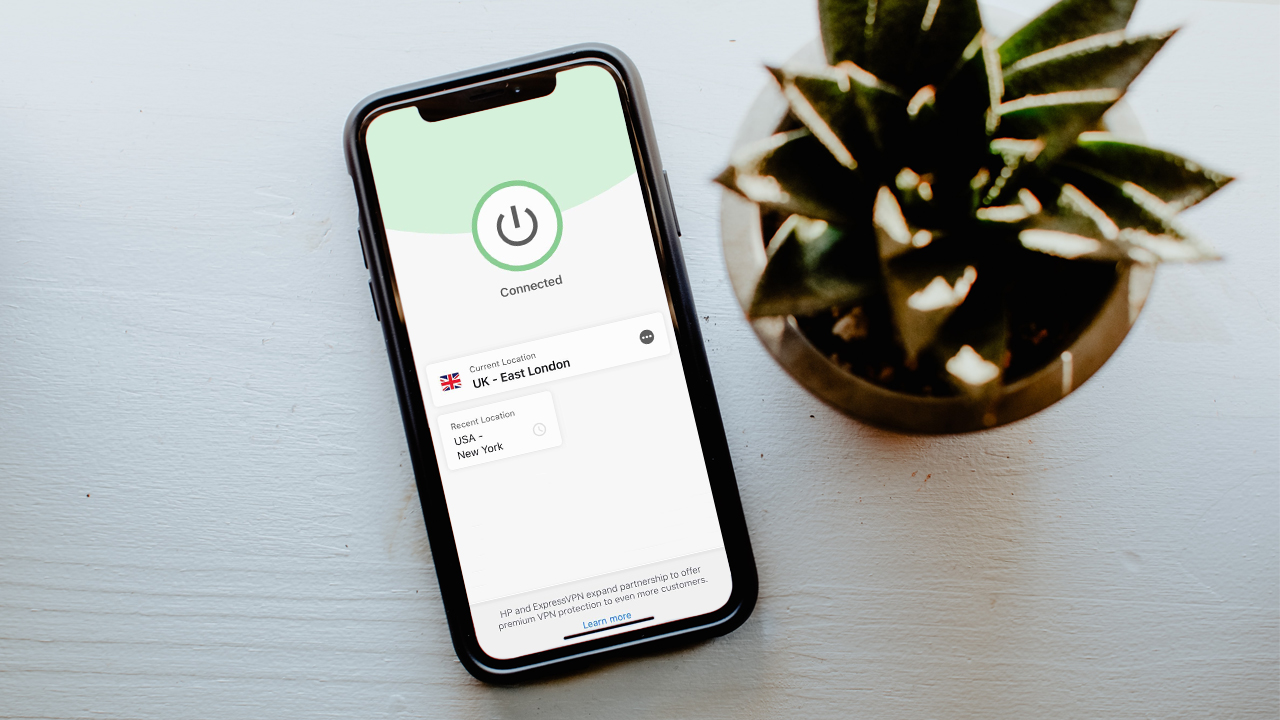
With simple yet powerful apps, great security and amazing unblocking capabilities, it's easy to see why ExpressVPN is our #2 VPN. It does come with a premium price tag, though.
For
- Apps that are great for beginners
- Great privacy features
- Good for torrenting
- Provides excellent 24/7 support
Against
- More expensive compared to other VPNs
Proton VPN is not only an excellent privacy-focused VPN, its also a good option for streaming. Not only this, but it offers a powerful free VPN that doesn't come with the same pitfalls as other free VPNs out there.
For
- Great apps across all platforms
- Excellent security
Against
- Connecting can take a while
- Support site can be difficult to navigate
It’s likely you’ve heard of both VPN providers I’m looking at today. ExpressVPN comes up in practically every conversation about quality VPNs, whereas ProtonVPN is well known for being one of the latest security products from the team behind the encrypted mail solution ProtonMail. Both providers regularly feature in our best VPN rankings, with ExpressVPN currently sitting just outside the top spot at #2 and ProtonVPN just below that at #5.
This doesn’t mean ExpressVPN is just an outright upgrade, however—there are definitely some aspects that Proton VPN excels at over ExpressVPN. To that end, I’m going to be comparing both VPNs based on security, speed, usability, and overall feature set to see where each VPN provider really shines. You can also check out our ExpressVPN and Proton VPN reviews for more in-depth analysis on each provider, too!
ExpressVPN vs Proton VPN: Which is more affordable?
ExpressVPN isn’t the cheapest VPN out there, but you can still make some pretty significant savings by buying into a long-term subscription. The monthly plan costs $12.95 per month, which is on the higher end average prices for a commercial VPN service. Buying into the six-month plan brings the price per month down to $9.99, making the subscription price $59.95 overall. The best value comes from ExpressVPN’s annual plan, which costs $8.32 per month for an overall price of $99.95.
ExpressVPN does not offer a free trial, but there’s a 30 day money-back guarantee on all of their plans which acts as a risk-free trial. There’s also a 7-day trial available only on their mobile apps.
Before I talk about Proton VPN’s paid plans, I should get something important out of the way. Yes, Proton VPN has a free plan. It’s one of the best out there, as it has truly unlimited bandwidth. However, it only covers three locations: The US, Netherlands, and Japan. It’s a great option if you just need to cover your connection while you’re traveling, but it’s not ideal if you want the freedom to stream content from anywhere on the planet.
Proton VPN’s monthly subscription plan costs $9.99, which is on the lower side of VPN subscription prices. Indeed, this is the same price you’d get if you bought into ExpressVPN for six months. The yearly plan chops that price in half, bringing it down to $4.99 per month for a total of $59.88 overall. However, purchasing the two year plan won’t net you anywhere near the same savings: it only brings the price down by another 5% compared to the monthly rate, working out at $4.59 per month, or $107.76 overall.
Like ExpressVPN, Proton VPN also offers a 30-day money-back guarantee on all of their plans. Proton’s free version is an easier way to trial out the service, but taking advantage of their money-back guarantee allows you to test out all of the paid features too.
ExpressVPN does not charge extra for additional features. No matter which subscription plan, you’ll get access to all of ExpressVPN’s features such as split tunneling, a system-wide kill-switch, a password manager, TrustedServer technology, and the proprietary Lightway protocol.
Proton VPN doesn’t offer any add-ons for their VPN as such. Instead, you can buy into Proton Unlimited, which provides the VPN as part of a full suite of privacy preserving tools along with ProtonMail, ProtonDrive, ProtonCalendar, and ProtonPass. For $12.99 per month, pretty much every aspect of your online life can be managed from Proton’s apps with the guarantee that you’re not being spied on.
When it comes down to it, Proton VPN is a clear winner on price if you’re just interested in core VPN capabilities. ExpressVPN and Proton VPN end up at a comparable price point if you consider Proton’s “all-in” Unlimited package instead, but you get far more functionality from Proton than Express at the same price. Based on sheer value, I have to give this one to Proton.
ExpressVPN vs Proton VPN: Which is faster?
Although ExpressVPN used to hold the crown for fastest VPN service, I’ve seen several providers post some very impressive speeds in recent months. Our testing of ExpressVPN’s OpenVPN protocol averaged out at 210Mbps, which is enough to power several connections in a small household. Moving onto their proprietary Lightway protocol, we logged speeds of around 410Mbps, almost double that of their OpenVPN servers.
These are pretty good speeds, but Proton VPN’s speeds really blew me away. Their OpenVPN speeds logged at 400Mbps, whereas their WireGuard implementation maxed out our connection at 950Mbps. You’ll have absolutely no issue browsing the internet, streaming, or gaming when you’re connected to ProtonVPN.

ExpressVPN vs Proton VPN: Which is more secure?
When you’re connecting to a VPN, you’re basically saying “I trust this provider to keep my data safe at least as much as I trust my ISP”. A well-designed VPN can keep you safe from the prying eyes of hackers, government agents, and advertisers, but a poorly made one exposes your data far more than if you just weren’t using one at all. That’s why it’s important to prioritize providers that take your data security seriously.
Of course, both ExpressVPN and Proton VPN have great reputations when it comes to data security. Both use industry-leading encryption standards like AES-256 to protect your data while it’s being sent to their servers. Each provider also uses OpenVPN, a widely used open-source VPN protocol known for its balance of speed, security, and flexibility that’s trusted by large enterprises worldwide to power VPN connections.
Where Proton VPN and ExpressVPN differ is in the extra protocols they support. ExpressVPN also uses its proprietary Lightway protocol, which has been specifically designed to provide faster connections than OpenVPN while also reacting better in situations where the underlying internet connection is constantly changing, such as while traveling with a mobile device.
Proton VPN provides WireGuard instead, which is an alternative open-source protocol that also offers faster speeds than OpenVPN. WireGuard is built to be lightweight and easy to audit, resulting in a VPN protocol that takes up less resources which makes it less demanding on battery-based devices like laptops and phones.
ExpressVPN has a strict no-logs policy enforced by use of RAM-only servers, meaning that their VPN servers cannot store any permanent user data between reboots. This also applies to their zero-knowledge DNS servers, which ExpressVPN uses to ensure that all DNS requests are handled within the VPN tunnel, in turn preventing your ISP from spying on which domains you’re visiting.
To demonstrate a total commitment to their no-logs policy, ExpressVPN regularly commissions a mix of third-party privacy policy and code security audits to demonstrate that their service is both trustworthy and secure. Between 2022 and 2023 alone, ExpressVPN underwent 12 independent audits using KPMG and Cure53. Unfortunately, while ExpressVPN does have a strong track record when it comes to privacy and security, I would be remiss to not discuss the DNS leak issues they’ve had in the past.
In February 2024, it became apparent that ExpressVPN’s Windows client had suffered for several years from an unpatched leak which caused some DNS requests to be silently sent outside of the VPN connection while Split Tunnelling was enabled. Although this issue affected only roughly 1% of ExpressVPN’s Windows users, they immediately disabled the functionality in affected clients and launched an investigation into the cause of the leak, resulting in a patched client and some interesting new research on the classification of DNS leaks.
Proton VPN’s reputation for privacy is similarly strong, if not stronger. Proton VPN is based in Switzerland, a country renowned for its strong privacy laws. As such, Proton VPN has a strict no-logs policy that’s backed by the courts. It’s also been audited independently by Securitum, one of the leading european security auditors. While ProtonMail has been compelled in the past to disclose the IP of a ProtonMail user under Swiss Law, there is no equivalent ruling for VPN use, meaning that even if law enforcement agencies in Switzerland make a request for user details Proton VPN are not required to hand them over.
ExpressVPN vs Proton VPN: Which is better for streaming?
With all the boring technical stuff cleared, I can finally talk about the stuff you’ll really want to know about: What streaming services can these providers unblock? Most VPNs claim they’re able to perform blanket unblocking of streaming services, but content providers like Netflix regularly go out of their way to block known VPN IP addresses from connecting to their servers. You need to make sure a VPN provider can put their money where their mouth is when it comes to unblocking, so I’ve tested a bunch of streaming sites against both providers.
One of ExpressVPN’s main selling points is that it can unblock nearly every streaming site you can think of. In practice, I found that all of the Netflix libraries I accessed in the US, UK, Japan, Australia, and Canada worked without issue. Moving onto other streaming platforms, everything I tried worked. You name it: BBC iPlayer, Amazon Prime Video, Disney Plus,9Now, 10 play, ITVX, Channel 4…it just worked.
Proton VPN isn’t as focused on streaming. That’s not to say they’re a bad streaming VPN, but I wouldn’t be surprised if some niche sites didn’t work with Proton VPN. Unfortunately, during testing I found out this was the case. All of the Netflix libraries I tried worked perfectly, as did the vast majority of providers I named above. However, 10 play isn’t accessible, which is the trend across a lot of VPN providers not named “ExpressVPN”. I also had some trouble getting into ITVX and had to bounce across a few UK based servers until I found one that worked, but your mileage may vary.

ExpressVPN vs Proton VPN: Which has better apps?
There’s no perfect VPN design. You might prefer a super minimalist “press-and-play” UI, or you might prefer something with a thousand dials and knobs to tune. You might even prefer a command line interface! All I can do is give you my opinion on what I like in a VPN app, in the hope it might give you an idea of what you prefer.
ExpressVPN’s desktop app has clearly been designed from the ground-up with simplicity in mind. The main interface is clean and uncluttered, featuring a large power button to connect and disconnect the VPN. Below the power button, there's a smart location feature that suggests the optimal server based on your location. If you’re not too worried about customizing your VPN, that’s all you’ll ever need.
However, eventually you’re going to want to pick something other than the closest server to you if you’re into streaming foreign content. Thankfully, the server menu is well-organized, allowing you to choose from a wide range of servers in 105 countries. The servers are listed alphabetically by country, and you can also search for specific server locations. Additionally, ExpressVPN offers a favorites system, where you can save frequently used servers for quick access.
Proton VPN’s desktop app takes a completely different approach. The stylish, almost clinical black and purple color theme combined with a world map which allows you to pick your VPN server based on physical location… it definitely evokes some sense of hacker chic (honestly, I have a sneaking suspicion at least one of their UI designers played the 2001 hacking simulator Uplink back in the day).
With an in-depth server list situated on the right, an indicator showing your current IP address, and a ticking graph that shows your current data speeds and overall bandwidth use, all overlaid on the world map, it can be a little overwhelming if you’ve never used a VPN client before. Thankfully, there’s some helpful tool-tips that point out different functions on the app when you log in for the first time. Complicated? Yes. But it does look very cool.

ExpressVPN vs Proton VPN: Which has better extra features?
The VPN industry is constantly re-evaluating what constitutes good value for money. If you’re not paying attention, you might be surprised about the extra functionality that’s baked into your VPN now. With that in mind, let’s take a closer look at which extra features each provider offers.
ExpressVPN focuses mostly on getting the core VPN experience down perfectly, but there’s a few extras bolted on that you should be aware of. All of ExpressVPN’s servers run on TrustedServer technology, which is essentially a way of running the operating system for the server entirely in RAM. This way, no user data is ever stored permanently in any of the servers ExpressVPN runs.
ExpressVPN also uses its own private DNS on every server, which means your DNS requests are handled by ExpressVPN with the same encryption and security that covers the rest of your internet traffic. This ensures your browsing stays private, even from your ISP. Working with ExpressVPN’s DNS servers has the added bonus of integrating Threat Manager into your browsing, which is a DNS based blocklist that prevents ads and other intrusive content from monitoring your online activities.
There’s also an integrated password manager called Express Keys which creates, stores, and autofill strong passwords on any device that runs ExpressVPN. It’s not a mindblowing addition, but it is pretty useful if you’re concerned about security and don’t want to pay for a separate password manager.
Proton VPN comes with a lot of extra features under the hood that might not be apparent at first glance. As I’ve mentioned before, ProtonVPN comes with a free version which gives you unlimited bandwidth and three countries to choose from. However, most of the extra features I’m about to list are only included in the paid version.
First up, there’s the Stealth Protocol which is an obfuscation protocol designed to bypass VPN blocks and censorship by disguising VPN traffic to look like regular web traffic. This makes ProtonVPN available in countries with heavy internet restrictions. Think China, Russia, Iran, anywhere where your ISP is likely to be forced by law to restrict VPN access.
Then there’s Proton’s VPN Accelerator technology, which aims to improve connection speeds by optimizing how VPN traffic is routed. This isn’t really strictly one technology so much as a series of tweaks made across many different parts of the networking stack to ensure you get the fastest VPN speeds. It’s impossible to tell how much of an impact this really has on your connection speeds, but Proton’s claims that they’ve worked multithreading into OpenVPN and rewritten Linux to make packet processing quicker certainly sound like sensible modifications.
Finally, there’s Proton VPN’s security focused features. Part of the reason for Proton VPN’s unique map-based app design is Secure Core. It allows you to route your traffic through an intermediary server before it’s sent to the endpoint VPN server that sends it back to the rest of the internet. The idea behind this is that even if the endpoint server you’re connecting to is compromised, all it’ll show is a connection to another VPN server instead of your home IP address.
Proton VPN further protects against hacking attacks using Perfect Forward Secrecy. The cryptography behind it is complicated, but it basically means that each session is encrypted with a different key. This means that even if your current internet session key is compromised, that can’t be used to decrypt any data you’ve sent in the past.
If you’re really worried about privacy and prefer to add an additional layer into your security setup, Proton VPN also offers Tor over VPN. When you connect to one of Proton VPN’s Tor-based servers, all of your internet traffic is sent through a VPN server and then over the Tor network to double up on the protection you receive from using Proton VPN. You’ll also be able the access the onion network without the need to install any additional software, which is pretty convenient if you don’t want (or can’t) install the Tor Browser.
ExpressVPN vs Proton VPN: Final verdict
If there’s one thing you should take away from this comparison, it’s that you can’t go wrong whichever provider you choose. ExpressVPN and Proton VPN are both great VPN providers. As for which one is better? Well… it depends on your priorities.
If you’re concerned about streaming above all else, there’s no comparison. Pick ExpressVPN. Again, Proton VPN is a good streaming VPN, but ExpressVPN is a truly great one. It’s also super simple to set up and deploy, their speeds are more than enough to stream 4K content, and with over 100 locations to pick from you’ll easily be able to find a server that unblocks the content you want.
For general use, the contest is a little closer. Proton VPN has one of the most comprehensive ecosystems for privacy tools out of any VPN providers I’ve seen, so if you’re a privacy fanatic I’d say go for Proton’s Unlimited plan and start migrating over your current email subscriptions, password managers, and so on.
While both ExpressVPN and Proton VPN offer excellent services, if neither quite provides what you need in a VPN then it’s worth checking out NordVPN. NordVPN combines high speed, a powerful set of security tools, and unparalleled unblocking capabilities in a single useful package at an affordable price. They’ve also been audited multiple times, and have a great track record when it comes to security. Add in unique features like Meshnet that allows you to build your own filesharing VPN and NordVPN is definitely one to look at if you can’t justify ExpressVPN or Proton VPN.







